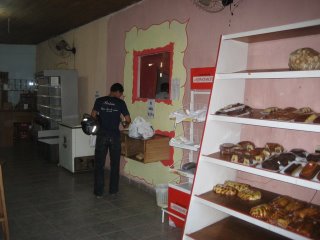
I have a candidate for worst title in translation of any film, ever. This is the Brazilian version of the classic Clint Eastwood western, "The Good, the Bad, and the Ugly." Its title in Portuguese is "Tres Homens em Conflito," or "Three Men in Conflict."
The Portuguese title has the virtue of being somewhat descriptive, since the movie is in fact about three men in conflict. But it has none of the poetic value of the original title, which manages to be both allusive and descriptive at the same time. (I confess it was years before I understood that the title really does label the three main characters--duh!)
And why not? The film could have perfectly well been called, "O Bom, O Mau e o Feio," which, for all my knowledge of Portuguese, would have translated faithfully the original title in every way. I think the answer has more to do with a harsh evaluation of the filmgoing public on the part of the people who make these decisions: that Brazilians need the title to tell them (or at least to seem to tell them) what the film is about.
Such is my working hypothesis, at least. At the establishment where this (pirated) movie was purchased, they also had "Brokeback Mountain." This title, which has by now become shorthand for jocular comments on male homosexuality in the US, seems devoid of descriptive content at first blush. So how did the Brazilian market render it? "The Secret of Brokeback Mountain." Ugh.
Aesthetic problems aside, the difficulty remains that such a title gives only the appearance of description. How do I know that it's not a kid's movie about rats involved in government experiments? (Remember "The Secret of NIMH")? I don't know what the secret is, just that there is a secret. Ah, so it's not some boring documentary about some mountain, there is something mysterious and intriguing going on at the mountain. And that's supposed to entice me, as a Brazilian film viewer? I don't get it.
Of course, "Three Men in Conflict" may have transmogrified for Brazilian film enthusiasts into much more than an achingly bland movie name. By now, it may have come to signify a high point of the spaghetti western--the "bangue-bangue" genre--, to evoke, by its mere mention, the silent cool of Clint Eastwood as the "Man With No Name," the eerie echo of Ennio Morricone's theme, and some foreign grandeur of the open American West.
Maybe.

 This is the bakery where I buy bread most mornings. I hop on my trusty, rusty cruiser, often with Grace as my co-pilot in her little saddle, and pedal up to the mouth of our street. Then it's past the feed store, the general store, and two butcher shops. Just as the hill starts to get steep, there is: "Mais que delicia," More than delicious, a little hole in the wall with a yellow storefront.
This is the bakery where I buy bread most mornings. I hop on my trusty, rusty cruiser, often with Grace as my co-pilot in her little saddle, and pedal up to the mouth of our street. Then it's past the feed store, the general store, and two butcher shops. Just as the hill starts to get steep, there is: "Mais que delicia," More than delicious, a little hole in the wall with a yellow storefront.



